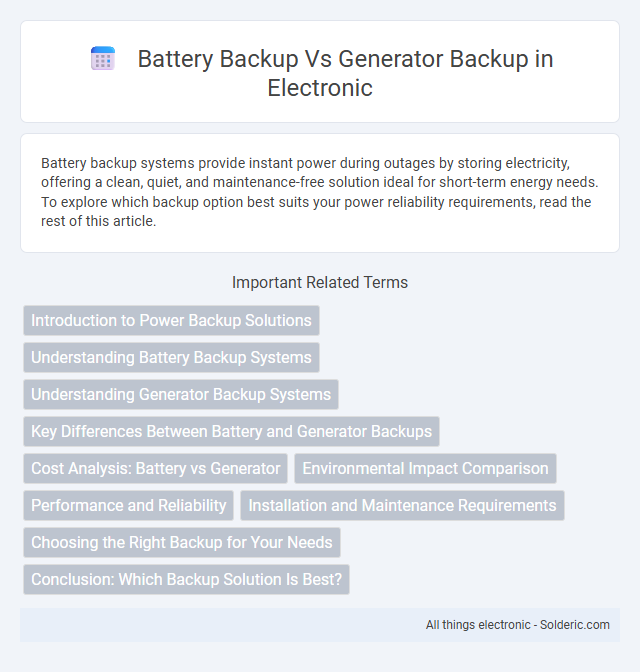Battery backup systems provide instant power during outages by storing electricity, offering a clean, quiet, and maintenance-free solution ideal for short-term energy needs. To explore which backup option best suits your power reliability requirements, read the rest of this article.
Comparison Table
| Feature | Battery Backup | Generator Backup |
|---|---|---|
| Power Source | Rechargeable batteries (usually lithium-ion or lead-acid) | Fuel-powered engine (gasoline, diesel, or propane) |
| Run Time | Short to medium duration (minutes to a few hours) | Long duration (hours to days, limited by fuel supply) |
| Start-up Time | Instantaneous | Several seconds to minutes |
| Noise Level | Silent to very low | Loud, engine noise |
| Maintenance | Low (battery health checks) | High (engine oil, fuel, mechanical parts) |
| Environmental Impact | Zero emissions during use | Emits greenhouse gases and pollutants |
| Cost | Higher initial cost, lower operational cost | Lower initial cost, higher operational and fuel costs |
| Typical Use Cases | Short power outages, sensitive electronics, surge protection | Extended power outages, heavy loads, outdoor sites |
Introduction to Power Backup Solutions
Power backup solutions ensure continuous electricity during outages, with battery backups storing energy from your grid or solar panels for immediate use. Generators provide power by burning fuel, delivering higher capacity for longer durations and supporting heavy loads. Your choice depends on energy needs, backup duration, and environmental considerations.
Understanding Battery Backup Systems
Battery backup systems store electrical energy in rechargeable batteries, providing instantaneous power during outages to keep essential devices running seamlessly. These systems are quieter, require less maintenance, and offer cleaner energy compared to traditional generators. Your choice should consider the duration of outages, power needs, and environmental impact to ensure reliable and efficient backup power.
Understanding Generator Backup Systems
Generator backup systems provide reliable, long-duration power during outages by converting fuel such as gasoline, diesel, or propane into electricity, ensuring continuous operation of essential devices and appliances. These systems are ideal for extended power interruptions due to their ability to produce high wattage and sustain energy supply without recharging. Your choice between battery backup and generator backup depends on the duration of power loss you typically experience and your power needs.
Key Differences Between Battery and Generator Backups
Battery backups provide instant power with zero emissions and minimal maintenance, making them ideal for short-duration outages and indoor use. Generators offer prolonged power supply by running on fuel such as gasoline, propane, or diesel but require regular maintenance and produce noise and emissions. The primary differences lie in power duration, environmental impact, operational noise, and maintenance needs.
Cost Analysis: Battery vs Generator
Battery backup systems typically have higher upfront costs due to advanced technology and installation requirements, but they offer lower long-term maintenance expenses and no fuel costs. Generator backup systems generally have lower initial purchase prices but incur ongoing costs for fuel, regular maintenance, and potential repairs. Your decision should weigh the total cost of ownership over time, including reliability and energy needs, to find the most economical backup power solution.
Environmental Impact Comparison
Battery backup systems produce zero emissions during operation, significantly reducing their environmental footprint compared to traditional generators that burn fossil fuels and release carbon dioxide, nitrogen oxides, and particulate matter. The lifecycle impact of batteries depends on the sourcing of raw materials like lithium, cobalt, and nickel, as well as recycling practices, while generators contribute consistently to air pollution and greenhouse gas emissions during each use. Renewable energy integration with battery backups further minimizes environmental harm, whereas generator reliance perpetuates dependence on non-renewable energy sources.
Performance and Reliability
Battery backup systems deliver instant power during outages with high efficiency and minimal maintenance, making them ideal for short-duration reliability and sensitive electronics protection. Generator backup systems provide longer-lasting power supply by running on fuel, offering robust performance during extended outages but requiring regular upkeep and fuel management. Battery backups are quieter and cleaner, while generators excel in sustained energy output where fuel availability is ensured.
Installation and Maintenance Requirements
Battery backup systems require minimal installation, often integrating seamlessly with existing electrical panels, and demand low maintenance, primarily involving periodic inspections and occasional battery replacements every 5 to 15 years. Generator backup installations are more complex, necessitating fuel storage solutions, proper ventilation, and professional setup to comply with local safety codes, while maintenance involves regular fuel checks, oil changes, and system testing to ensure reliable operation. Battery backups provide a cleaner, quieter solution with lower long-term upkeep, whereas generators offer extended power duration but require more intensive and frequent maintenance efforts.
Choosing the Right Backup for Your Needs
Battery backup systems provide instant power, making them ideal for sensitive electronics and short-term outages, while generator backups deliver extended power for longer durations and larger appliances. Assess your energy requirements, outage frequency, and fuel availability to determine the most suitable option. Cost-effectiveness and maintenance considerations also play a key role in choosing between battery and generator backups.
Conclusion: Which Backup Solution Is Best?
Battery backup systems provide instant power during outages, ideal for short-term needs and sensitive electronics, while generators offer extended power supply suitable for longer outages and higher energy demands. Cost, maintenance, fuel availability, and noise levels are critical factors influencing the choice between battery backup and generator backup. For seamless, eco-friendly performance with minimal upkeep, battery backups excel, whereas generators remain the best option for prolonged, heavy-duty power backup scenarios.
Battery Backup vs Generator Backup Infographic

 solderic.com
solderic.com